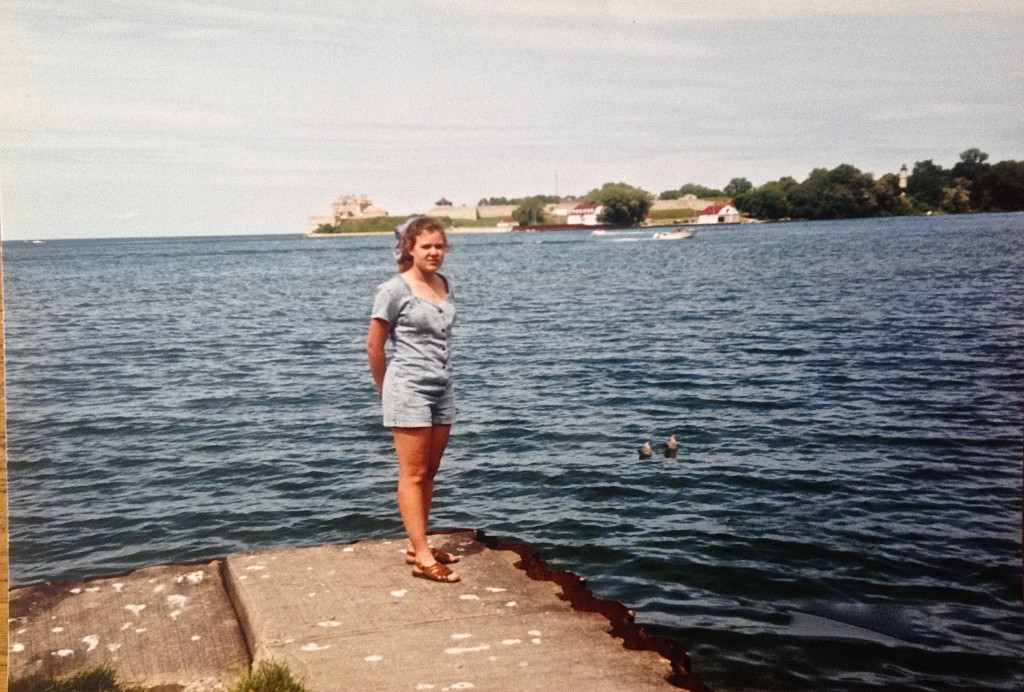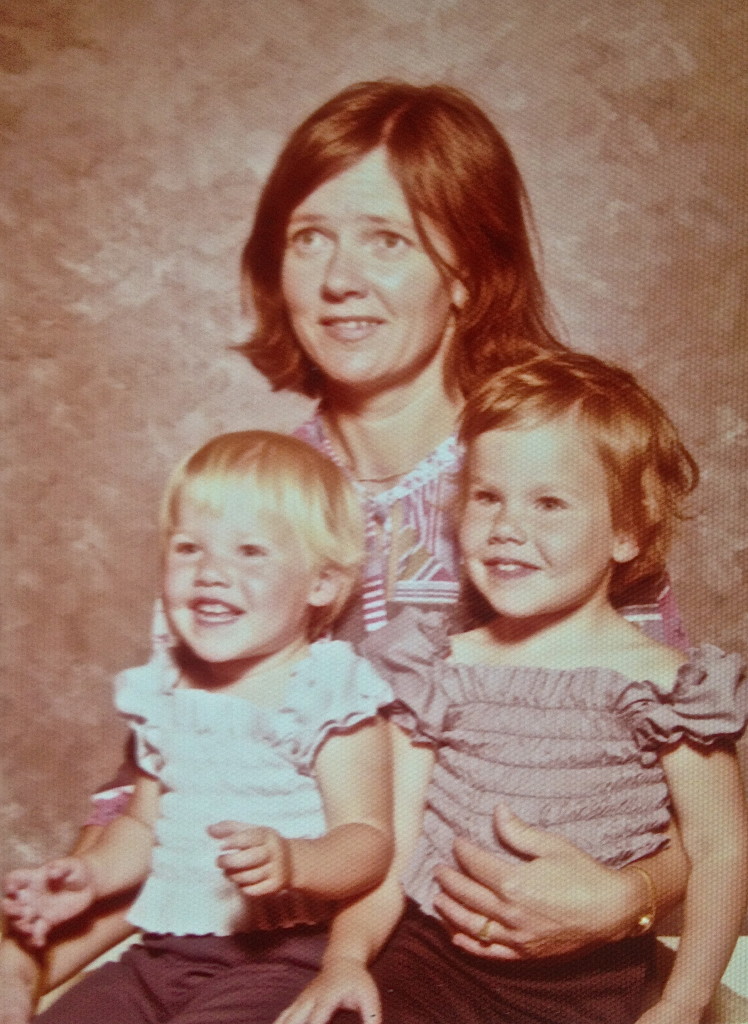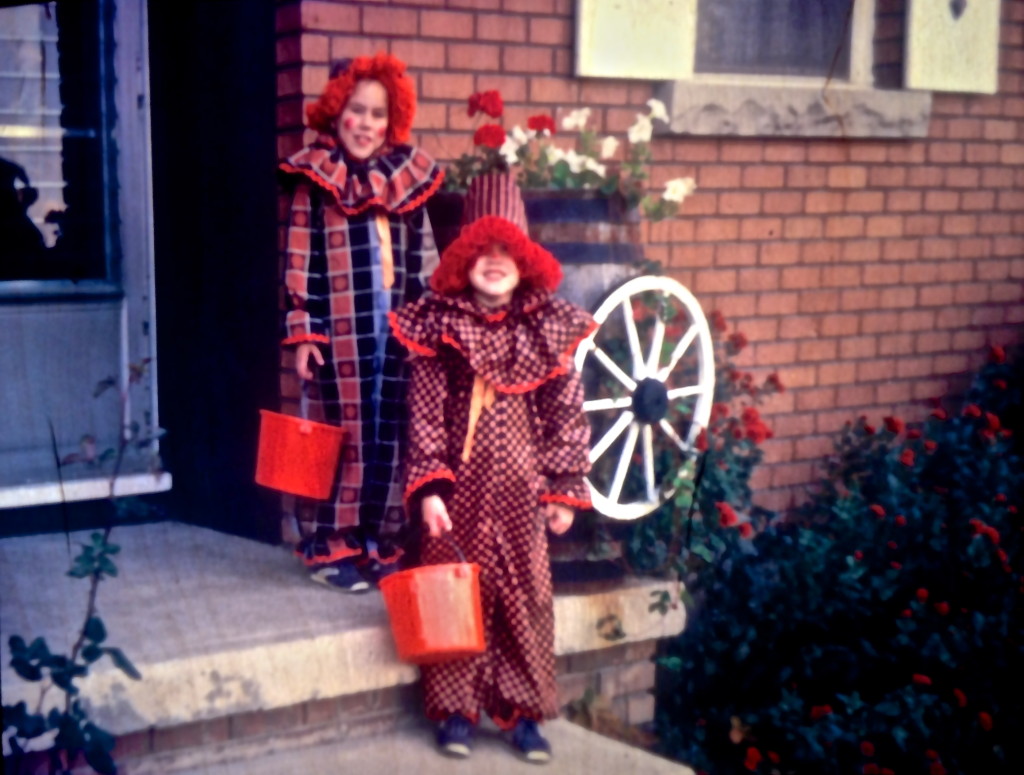Twenty years ago, on April 6, my mother died. This is a true story about our last days and moments together.
Mommy loved to entertain my sister and I with her many stories of escape, especially the ones from when she was a little girl in Europe. She would deliver these stories to us as if they were sweet treats saved up for special occasions. Sometimes she would reminisce while we walked on our way to view the sunset on a balmy summer night. We’d stroll along arm-in-arm-in-arm, our steps in rhythm as she took us back in time to a life that our young minds could barely only imagine.
Her first escape occurred was when she was just five years old. September 1943, WWII. The German army ‘escorted’ nearly 35,000 German-Soviet Mennonites from Ukraine toward Poland. They (my mother and grandmother) walked in rain and mud alongside a caravan of wagons 10 kilometers long. When they didn’t walk, they rode in open cattle cars, snow falling on their heads. Many didn’t survive. The Trek (as it is officially known) was a seven month trip and the beginning of escape from many things. Oppression. Communism. Starvation. Death. It was also the start of my mother’s wanderings that would eventually lead her through Poland and Germany, across the ocean and, finally, to a small farm in Grimsby, Ontario.
There were many more stories of escape including schools, hospitals and orphanages in the years following the Trek. My sister and I would listen, wide-eyed, to all of her tales of mischief and adventure. I couldn’t help but feel a deep sense of admiration for her tenacity and courage. I wanted to be like her. I believed that she could do anything and solve any problem. She was a person who knew how to get out of a sticky situation.
Eventually, to my great delight, I had the honour of being my mother’s accomplice in a planned escape. I was sixteen. It was Canada Day weekend and she was in the hospital again. The cancer had returned the year previous and was slowly making it’s way to the far reaches of her body.
The route of the cancer was something like this (you can hum along to the tune of Dem Dry Bones):
The Breast Cancer’s connected to the Bone Cancer …
The Bone Cancer’s connected to the Kidney cancer …
The Kidney Cancer’s connected to the Liver Cancer …
… and so on until you have included the whole body in the song.
On this particular summer day, Mommy was in the hospital for a reason I can’t recall. Perhaps to drain her kidney of fluid. I remember a few times when she had a tube hooked up, a brown liquid slowly seeping out. On this particular day she was stable and unhooked. Waiting for nothing, as she put it.
Canada Day was the perfect day for an escape. Sunny with blue skies. Not exactly a day to spend inside a prison cell. That’s how Mommy would refer to her hospital room. The sealed window revealed to her exactly how wonderful and beautiful the outside world was. She was longing for the best kind of healing a girl can get – sunshine and fresh air!
Sitting upright in her bed, eyeglasses on her nose, gown tied loosely in the back, she held the local newspaper open to the events section. Inspired with an idea, she looked up and casually asked the nurse … “So, what’s the protocol on leaving the hospital for a daytrip?”
“Not possible … it’s against the hospital rules” replied the nurse flatly.
“Tell me, what would you do if you discovered a patient wasn’t in their room? Would you assume that they had gone for a stroll in the building. To the cafe on the first floor, for instance, and that they’d be back soon?”
“Yes, I suppose so.”
Not wanting to waste any more sunshine, mommy immediately picked up the phone beside the bed and called a friend to hatch her plan. Shortly thereafter, said friend picked me up from home. Mommy had called ahead and instructed that I bring along a small bag filled with escape clothes for her. As for my outfit, she had a plan for that, too.
“Why don’t you wear your new blue-jean jumpsuit from Sears? And, I like the way you tie the silk scarf in your hair.” She was always making requests on what I wore. I didn’t mind at all. I liked to make her happy.
Soon, we pulled up to the automatic doors of the hospital where Mommy was waiting with a giant, mischievous smile on her face. Pointing to the newspaper article “This is where we’re going today!” she said.
Her finger was resting on an ad for “Art in the Park” in Niagara-on-the-Lake. She had a hankering for art, original paintings, the Niagara river, clear sunshine, a gentle breeze and cool, blue Lake Ontario. Mommy had her camera and asked me to pose by the rocks on the river to document our perfect afternoon. I stood amongst all the seagull poop on the cement and tried to smile even though I was a little grossed out. Mommy snapped the photo.
She was content and quite pleased with herself for having executed another great escape. I watched as she turned her face toward the sun. That summer afternoon was a stolen moment of perfection sandwiched between a long row of disappointing days. A consolation prize which helped to soften the slow and steady defeat that was constantly bearing down on her. This was how my mother coped. This was how she lived. If she didn’t steal moments, there would never be any.
I never thought to take a picture of her. I didn’t know that our moments were running out.

Here is the picture my mother took of me at the pier in Niagara on the Lake. Clearly, I’m thoroughly disgusted by the seagull poop all over the ground.
A year and a half later, on April 6, the snow fell in large fluffy flakes. Driving home from the hospital, my sister and I didn’t have much to say. The same quiet that blanketed the snow covered night was filling the space between us. Heavy, but peaceful. We had steep learning curve to navigate ahead of us. Our team of three had just been reduced to two. I was relying on my sister to take the lead, she being older and wiser by a year and a half. She was 20. I was 18.
The memories of that night come to me now in flashes. The yellow, hollow corridor labelled “Palliative Care”. The wish to look those words up in the dictionary in order to understand their meaning. Busy nurses accustomed to turning their faces away from tears. Questions. Flowers. The pastor. An unending elevator ride. Our white Oldsmobile in the parking lot across the street. The long walk to get to it. The empty thud of the car door. Vacuous silence. Snow. Burleigh Hill glimmering as it always did with headlights reflecting on limestone. The bump at the end of the driveway. Our front door clicking open up to a house with an empty bedroom.
When she died, I wasn’t there. I had left for a handful of minutes to run an errand. Arriving back at the hospital, stepping out of the elevator, my sister was standing there. Her face told me the story in an instant.
It was a punch to the gut. All my breath sucked out of me. Jelly legs. A sense of collapse from the inside. Standing, even though it seemed impossible. Walking forward, though I never chose to.
I had no words, no voice. I was ushered inside the room and left alone with what was my mother. Mommy. Alone. Still. Cold. Mouth open, but no breath going in or out. My sister said her eyes opened wide and looked straight at her right before the end. The nurse had put Mommy’s eyelids down by the time I got there.
Just inside the closed door, I stood and looked around the room. A mile between me and the bed. She’s not here. She’s gone. This is just her empty body. A shell. I spoke these words to myself out loud as though it would force some sense of understanding to what was literally unbelievable to me. My mother. Gone. It happened in a moment and now it couldn’t be undone. Hope fizzled.
I moved a few steps closer to her, next to the bed, my hand resting on the sheet by her feet. I thought about her heart. How it had sustained her feet, kept them warm. I didn’t touch them, didn’t need to. I knew that they would be cold. She was always asking me to rub her feet to warm them up, to get the blood moving. No sense in trying that now. I mindlessly reached for the flowers on the side table to make a little bouquet. It felt better to be busy with my hands while my head did the heavy work of comprehension.
I ripped apart an arrangement. A stiff, triangular design in a plastic dish. Traditional. Ugly. Purple liatris, white daisies, september wheat, pink statice, fern, and carnations. These flowers took on new life as I made them into little bouquets. Reincarnation. Placing them on her unmoving chest, closer now, I looked at my mother’s face. Did I see an eyelid flutter? I leaned over her body awaiting another breath. I watched for the faintest rise in her chest or the twitch of a finger. I put my finger under her nostrils.
Nothing.
Permanence began to settle in. I hadn’t considered anything to be permanent until that very moment. She’s gone. This is just her body. She’s not in there. These words were beginning to sound like a mantra as I repeated them. I reached for more flowers. Another bouquet. I placed it in her hands and whispered to her I don’t think you’re in there anymore. A revelation. Words spoken to my mother, but meant for me.
That’s when the tears came. In heaves. I was folded in half, crumpled on the floor. Breath being sucked in faster than what I could let out. Flowers clutched in my hand. Forgotten. Crumpled. Broken.
My head pounded, blood rushed and swirled in my ears as I leaned my head against the bed. A loud buzz drowned out all sound. Memories, like waves, flooded in. I remembered our walk on Saturday, just 5 days previous. Without fail, the sunshine always drew my mother outdoors. I’m a nature-baby! she would say. For our walk, we went around the small block and past the tree-canopied median with all the birdfeeders. I held her arm. The birds sang. She was slow, but still capable. Determined. That was the last day she was able to fit shoes over her bloated, yellowing feet. That was our last walk.
I made a list of other lasts. Last dinner. Last movie night. Last paska. Last bike ride. Last card game. Last time I made her laugh. I couldn’t even remember these moments anymore. Gone and forgotten. Ancient history. My mother was already fading from my memory. It was all happening too fast. She was a jewel dropped in a pond, disappearing from view.
Lifting my head from the bed, I uncrumpled my body and stood upright, heaving and sobbing in exaggerated bursts.
I returned back to the flowers. Another arrangement. Another bouquet and so on. I busied myself until all of the flowers and plants in the room had been made into little flower bundles. Then I placed them carefully, quietly, on top of the blanket and around the short, chemo-curly hair on my mother’s head, in her hands and around her feet. This was all I could do. It became my offering, my temporary solution. The busy-ness was soothing. Addictive, even.
We need to talk. This is what she said to me on Sunday afternoon, the day after our walk around the block.
About what, I’ll never know. On that day, I didn’t have time for a conversation. I’m very sick was all she said before I went out the door. I thought we had more time. She probably thought so, too. I thought she’d still be there when I came home.
I should have seen it coming from a thousand miles away. The dust on her dresser was thick. My mother, so tidy, always kept her dresser clean. I didn’t see it until she was gone. While I was out, she called a friend who drove her to the hospital for the last time.
Obvious signs. Missed opportunities. Overlooked conversations. Moments that can’t be returned to or redone. Haunted dreams. Recurring visions. Apologies heaped on apologies.
I wish that I could have done more for you girls. That I could have given you more. Her last words.
These words were spoken on Monday, two days before the end. An apology. Turns out we both had much to be sorry for.
Unmeasured time passed and eventually all the arrangements were torn apart. Wicker baskets and plastic containers remained, empty and vacant. Green foam. Wet, broken and cracked, holes poked everywhere.
Flower arrangement carcasses.
Foliages strewn about, spilled onto the hospital tables, the floor sprinkled with fern fragments. Discarded blooms tossed to the side. The distinct scent of chlorophyl and the sweet spice of carnations in my nostrils.
Still, I spoke my mantra. As though the words would be some kind of consolation or provide some comprehension. These elude me, still.
Often I wonder if she had an awareness of what was about to happen, a moment before she left this world. Perhaps she was afraid and that’s why she opened her eyes. Or maybe she was relieved. Or curious. Did she see God? It’s hard to know how much consciousness someone has when they’re drugged up with morphine. Do they have any say in what happens next?
Since I don’t have any answers to these questions, I have decided to make my own conclusions. I choose to believe that Mommy knew exactly what she was doing. The moment of transition from life to death was an act of her choosing. Another of her great adventures into the unknown. That this last and final journey was part of a plan. Her escape plan.
Except in this story, when she escaped from life, she also escaped from me.
If she were still here today and if she could read my words as I write them on this page, I would assure her that the only thing I wished she’d been able to do more of is stay here with me for a little longer. The same words she said to me before she died, I would also say to her. I wish that I could have done more for you. That I could have given you more. I’m sorry.
I loved to hear her talk to me and tell her stories. Especially the ones of escape. Sometimes I make up a different ending to her story. I imagine she didn’t die. Instead, in order to tell the story of this last adventure, she lived. I imagine her telling me the story about the time that she was sick, but then found a way to escape, even though it seemed impossible. That time when she found herself in a sticky situation, one that had little hope, but she turned it around and survived, much to our surprise and delight. That time when, instead of escaping life, she escaped death.
Twenty years after my mother’s story came to an end, I still remember much of it – what I saw from my vantage point as a teenager. Now, I have picked up her pen and continue to tell her tales of adventure, heartache, courage and yes … even her death. Some stories, like this one, are difficult and I am exhausted from the telling. The emotions are too raw, too real, even now. My face is stained with tears. Still.
Beautiful memories seem to come in the same package as pain and regret. I think my mother would agree with me on that. I’m too much like her … I still tell the stories anyway.



Ruth Janzen
Hugs and love;
Cousin Ruth
Cherie
*tears*
Thank you for sharing this story. I am sure it wasn’t easy… But telling her stories keep her with you and alive in memory.
Jennifer
Hi Cherie,
Thanks for the comment … and you’re right – this one was incredibly difficult and very exhausting. But so worth it. Thanks for reading it … and for crying a little bit, too.